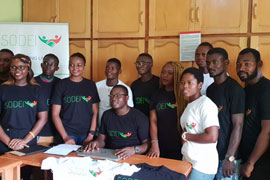Thousands of children in Cameroon wake up with no hope of a life-changing school day ahead, facing displacement, violence, hunger, ill-health and poverty as a result. Most of these children have not known the inside of a classroom for the past three years. Some children have not read a textbook or known the care of a good teacher for the past three years.
International organizations working for children’s rights and welfare such as UNICEF have estimated that upto 80% of schools in Cameroon are now closed affecting more than 600,000 children. While the situation has deteriorated into a humanitarian crisis, by drawing the attention of sympathizers on the plight of children and girls caught in the crossfire, we can make a difference for the forgotten children!
“We want our fellow Cameroonians to do their best to send our children #BACKTOSCHOOL,” said Gilbert Ajebe Akame – SODEI’s CEO and Co-Founder. SODEI is a non-governmental international charity catering for disadvantaged children and empowering youth in Cameroon and Africa. The organization believes in the power of education as the key instrument to unlocking the potential of young people and the vehicle for driving peace and sustainable development in local communities.
“Our stubbornness is failing humanity and the very differences are not just keeping our children out of school but adding to their vulnerability. Hence, we have made it easier for our youth to be radicalized and prone to all dangers associated to that,” explained Gilbert. “They are deprived of their fundamental human right as well as the support they need and deserve to nourish their beautiful minds. By all means, we have left them on their own with no awareness to discern good from bad.”
SODEI calls on all parties to the conflict to make a sincere effort so that:
- Every child has a free and uninterrupted access to education.
- Families, teachers and schools work together to put an end to education and learning becoming casualty.
In a recent interview in the US, the Bishop of Mamfe, Bishop Andrew Nkea, made commitments on behalf of the Church, that they are putting in place measures to guarantee the security of children who will attend catholic schools in the academic year 2019/2020.
This is the first time since the beginning of the conflict that such assurances have been made. We are deeply concerned and ask other institutions and stakeholders to follow this example, to take measures and make commitments for a safe return to school. We want the government to take concrete steps to provide maximum security for teachers and schools. We also call upon parents and the local communities to join efforts to ensure children’s unimpeded access to schools. Above all, we call upon children and young people who are active agents and arbiters of their destinies, to stand up and defend their right to education. Stand up like Malala Yousafzai did, raise your voices and defend your right to be in school.











